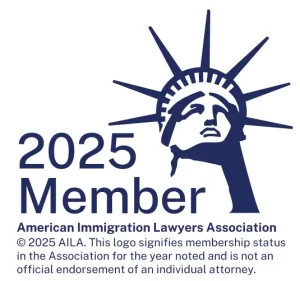Immigration Court & Removal Defense: Your Complete Guide to Fighting Deportation
Bottom Line Up Front: If you’ve received a Notice to Appear (NTA) for removal proceedings, you’re not automatically going to be deported. With proper legal representation and the right defense strategy, many people successfully fight removal and obtain legal status to remain in the United States. The key is acting quickly and understanding your options.
Facing removal proceedings in Immigration Court is one of the most serious situations a non-citizen can encounter. Unlike criminal court, you don’t have a right to appointed counsel, and the stakes couldn’t be higher—your ability to remain with your family, continue your career, and build your life in America.
At Immigration Law of Montana, we’ve helped clients throughout the Rocky Mountain region navigate these complex proceedings for over 28 years. Whether you’re detained or have received a Notice to Appear, understanding the removal defense process is crucial to protecting your future.
What Are Removal Proceedings?
Removal proceedings are the legal process by which the U.S. government seeks to remove (deport) non-citizens from the country. These proceedings take place in Immigration Court before an Immigration Judge, where the government must prove you are removable under immigration law.
Common reasons for removal proceedings include:
- Entering the United States without inspection
- Overstaying a visa or other authorized period
- Violating the conditions of your immigration status
- Criminal convictions that make you deportable
- Immigration fraud or misrepresentation
- Failure to maintain valid immigration status
The Notice to Appear: Your First Warning
Removal proceedings begin when Immigration and Customs Enforcement (ICE) issues a Notice to Appear (NTA). This document serves as both a charging document and a summons to appear in Immigration Court.
The NTA contains critical information:
- The specific grounds why the government believes you’re removable
- Your scheduled court date and location
- Important rights and obligations
- Potential consequences of failing to appear
Important: Simply receiving an NTA doesn’t mean you’ll be deported. The government still must prove its case, and you have the right to contest the charges and apply for relief from removal.
Your Rights in Immigration Court
Despite not being entitled to appointed counsel, you have significant rights in removal proceedings:
- Right to legal representation at your own expense
- Right to an interpreter if needed
- Right to examine evidence against you
- Right to present evidence and witnesses on your behalf
- Right to cross-examine government witnesses
- Right to appeal adverse decisions
- Right to apply for relief from removal if eligible
Types of Relief Available
Even if you’re found removable, Immigration Judges can grant various forms of relief that allow you to remain in the United States:
Defensive Applications for Status
- Adjustment of Status to lawful permanent resident
- Asylum for those fleeing persecution
- Withholding of Removal for protection from persecution
- Convention Against Torture (CAT) protection
Discretionary Relief
- Cancellation of Removal for long-term residents
- Immigration Waivers for various grounds of inadmissibility
- VAWA Self-Petitions for domestic violence victims
- U Visa applications for crime victims
Other Forms of Relief
- Voluntary Departure to avoid a removal order
- Administrative Closure in appropriate cases
- Prosecutorial Discretion requests
The Removal Defense Process
Initial Hearing (Master Calendar)
Your first court appearance is typically a Master Calendar hearing where the Judge will:
- Review the charges against you
- Determine if you understand the proceedings
- Ask how you plead to the charges
- Set deadlines for filing applications
- Schedule your Individual Hearing
Individual Hearing (Merits Hearing)
This is your trial where you can:
- Contest the government’s charges
- Present evidence supporting your case
- Apply for relief from removal
- Have witnesses testify on your behalf
- Make legal arguments through counsel
Decision and Appeals
After your Individual Hearing, the Immigration Judge will either:
- Grant relief and allow you to remain
- Order removal from the United States
- Continue the case for additional proceedings
If ordered removed, you generally have 30 days to appeal to the Board of Immigration Appeals (BIA).
Why Legal Representation Matters
Statistics consistently show that individuals with attorneys are significantly more likely to succeed in removal proceedings. An experienced removal defense attorney can:
- Identify all available relief options you might qualify for
- Gather supporting documentation and evidence
- Prepare compelling legal arguments for your case
- Navigate complex procedural requirements and deadlines
- Negotiate with ICE attorneys when appropriate
- Handle appeals if necessary
Criminal Convictions and Removal
Criminal convictions can make non-citizens deportable, but not all convictions have immigration consequences. Key considerations include:
Aggravated Felonies
Certain serious crimes classified as “aggravated felonies” under immigration law can bar most forms of relief and make removal nearly automatic.
Crimes of Moral Turpitude
Convictions involving fraud, dishonesty, or intent to harm can trigger deportability, though waivers may be available.
Drug Offenses
Most drug convictions make non-citizens deportable, though some exceptions and waivers exist.
Important: Even if you have criminal convictions, you may still have options. Some convictions can be challenged, and various forms of relief remain available depending on your circumstances.
Detention and Bond Issues
ICE may detain you during removal proceedings, but detained individuals often have the right to request release on bond. Factors Immigration Judges consider include:
- Whether you’re a flight risk
- Danger to the community
- Ties to the United States
- Immigration history
- Criminal record
Some individuals facing removal are subject to mandatory detention and not eligible for bond.
Special Considerations for Different Cases
Family-Based Cases
If you have U.S. citizen or permanent resident family members, you may be eligible for family-based relief even in removal proceedings.
Humanitarian Cases
Those fleeing persecution, torture, or domestic violence may qualify for protection under various humanitarian programs.
Long-Term Residents
If you’ve been in the United States for many years, cancellation of removal may be available even with some criminal history.
The Importance of Acting Quickly
Time is critical in removal defense cases. Deadlines for filing applications are strict, and missing them can result in losing eligibility for relief. Additionally:
- Evidence becomes harder to obtain over time
- Witnesses may become unavailable
- Legal requirements may change
- Your circumstances may deteriorate
Why Choose Immigration Law of Montana for Removal Defense
With over 28 years of experience in immigration law, we understand the complexities of removal proceedings and have successfully helped countless clients avoid deportation. Our approach includes:
- Comprehensive case evaluation to identify all possible relief options
- Thorough preparation of applications and supporting documentation
- Skilled advocacy in Immigration Court
- Strategic planning for complex cases
- Personalized attention to your unique circumstances
We serve clients throughout Montana, North Dakota, Wyoming, and the entire Rocky Mountain region, including those detained in immigration facilities.
Take Action Now
If you’ve received a Notice to Appear or believe you may be subject to removal proceedings, don’t wait. The sooner you seek legal help, the more options you may have available.
Contact Immigration Law of Montana today for a consultation about your removal defense case. We’ll evaluate your situation, explain your options, and develop a strategy to fight for your right to remain in the United States.
Remember: Removal proceedings are not automatic deportation. With the right legal strategy and experienced representation, many people successfully defend against removal and obtain legal status. Your case deserves a strong defense.
This article provides general information about removal defense and should not be considered legal advice for any specific case. Immigration law is complex and constantly changing. For advice about your particular situation, consult with an experienced immigration attorney.

